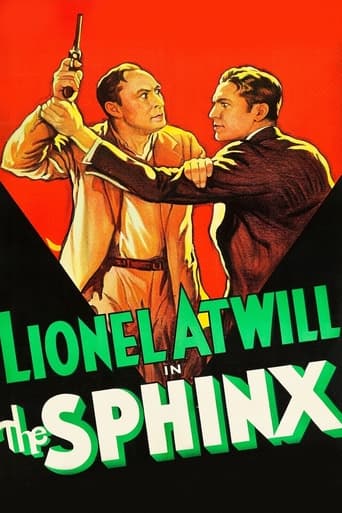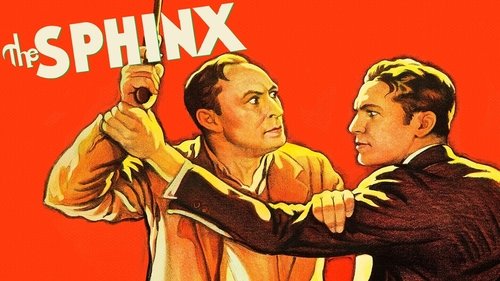JohnHowardReid
Lionel Atwill (Jerome Breen), Sheila Terry (Jerry Crane), Theodore Newton (Jack Burton), Paul Hurst (Hogan), Luis Alberni (Luigi), Robert Ellis (Inspector Riley), Lucien Prival (Jenks, the butler), Paul Fix (Dave Werner), Lillian Leighton (Mrs Werner), George "Gabby" Hayes (Detective Casey), Wilfred Lucas (prosecutor), Hooper Atchley (defense attorney), Theodore Lorch (Dr Kelton), Ernie Adams (Tony, the bartender), Jack Cheatham (homicide man).Director: PHIL ROSEN. Screenplay: Albert DeMond. Photography: Gilbert Warrenton. Film editor: Doane Harrison. Art director: E.R. Hickson. Music director: Abe Meyer. Dialogue director: Wilfred Lucas. Sound recording: John Stransky, junior. Producer: Sid Rogell. Executive producer: Trem Carr.Copyright 2 August 1933 by Monogram Pictures Corporation. New York opening at the Mayfair: 5 July 1933. U.S. release: 1 June 1933. U.K. release: 18 November 1933. 7 reels. 64 minutes.SYNOPSIS: After murdering a stockbroker, a well-spoken man stops to talk to the janitor of the office building. The janitor identifies the killer, who is arrested. But the jury discards the janitor's evidence in court when the prisoner turns out to be a deaf mute who could not possibly have spoken a single word.COMMENT: Lionel Atwill saves the day in this somewhat over-talky mystery thriller. When Atwill is on screen, the movie is always suspenseful; but when argumentative love-birds Sheila Terry and Theodore Newton take center stage, interest takes a back seat. (I notice that these two romantic leads were borrowed from Warner Bros. Was that trip necessary? I think not. True, Miss Terry is passably attractive, but Mr Newton is a first-class bore). Fortunately the support cast is also strong (Lucien Prival proves an absolute stand- out), though Paul Hurst seems uncertain whether to play his role for sympathy or laughs. He ends up doing both and manages to juggle our emotions with reasonable dexterity. Phil Rosen's direction is occasionally deft, occasionally static, but mostly competent. Photography and other credits are above average by Poverty Row standards.
classicsoncall
If you're scoring this one on the basis of what came out of the early talkie era, then it's actually pretty good. Lionel Atwill does double duty in the picture as millionaire socialite Jerome Breen and his deaf mute brother. About half way into the picture with the dead bodies piling up, I had a sneaky suspicion that the film makers were going to pull this ruse to make the story seem plausible, but having the 'hidden' Breen sibling pop up every time the secret door was opened was just a little too obvious, not to mention hokey. I realize these Poverty Row productions couldn't keep you guessing for much more than an hour, so I guess they did the best they could here.You know what seemed really dumb to me? Near the end of the story, when reporter Burton (Theodore Newton), and Detective Casey (what? - that was Gabby Hayes!!) hear Burton's gal Jerry (Sheila Terry) scream for help inside the Breen mansion, they make a mad dash for the entrance, and then wind up knocking on the door!! What?!?! If you're a fan of these old time mysteries, you'll note a couple of elements that would wind up being repeated in subsequent films. For example, Charlie Chan used a coin toss to test the hearing of a supposedly deaf person more than once, in "Charlie Chan's Murder Cruise" (1940), and later on in "Dark Alibi" (1946). There was also a variation of the poison ring gimmick in the 1945 flick "The Shanghai Cobra". I'm sure there are other films that recycle similar gimmicks like this, but these are the ones that readily come to mind. Oh, and by the way, the cruise director in that Chan movie I just mentioned - it was Lionel Atwill!
dbborroughs
There is something chilling about Lionel Atwill in this movie. With out saying nary a word he manages to make you want to crawl out of your skin. The plot of a mute man on trial for a murder committed by a killer who spoke is filled with pitfalls and possibilities. The film avoids most of the former while finding many of the latter in telling a very good story.But above it all is Atwill who manages to keep you in suspense to the very end, milking the fact that he can't use that magnificent voice of his for any effects what so ever. Its like stripping a great singer of their voice and then still having them convey the emotion of the music by gestures alone.No its not perfect, there are bits that have dated slightly, for example the sign language is silly, but its still a good thriller with a great performance at its center.7 out of 10
BaronBl00d
Philanthropist Jerome Breen walks out of a room and goes to an office building custodian and asks what time it is. He nonchalantly leaves while the other man goes to a nearby office and finds yet another stock broker choked to death by incredibly strong hands. All would seem to point to Breen as he was seen by an eye witness, but Mr. Breen is medically a mute. Such is the story behind The Sphinx. It is a craftily-made little thriller with some comedic touches against the backdrop of a rather ingenuous mystery. Lionel Atwill plays the ubiquitous Breen and the biggest regret...not flaw, but regret..is that he has so few lines in the picture. Atwill and his use of clever timing and sardonic wit are always a major plus to any picture, yet Atwill can and does employ his facial muscles to convey much. The other actors are all strangely pretty decent with the gentleman playing the custodian, an Italian that drinks a bit, turning in a fine comedic performance. The mystery in the end is not easy to guess, perhaps a bit contrived, but wholly enjoyable.




